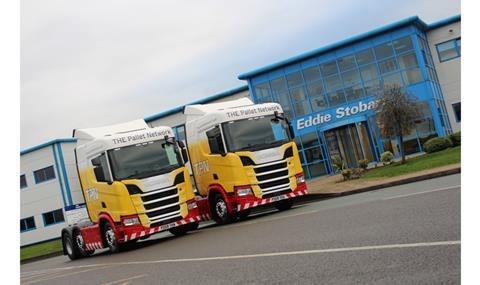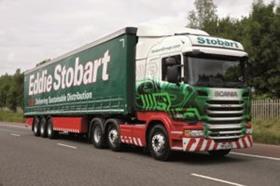
For a man that has led The Pallet Network (TPN) through its biggest change in recent history, namely joining the Eddie Stobart Logistics (ESL) fold, Mark Duggan comes across as assured and relaxed when motortransport.co.uk catches up with him.
The reason for the interview with TPN's MD is that it’s now more than six months since the network’s backer, private equity company LDC, decided to bring its 11-year ownership to an end.
The decision caused a wave of excitement within the road transport industry after ESL proved the successful suitor, and tantalisingly created something new in the mature pallet-network sector.
Duggan has previously described the purchase by the national operator, which has been building its capability in several sectors, as the evolution of the pallet network model.
In a press release issued to support the six-month milestone ahead of this interview, TPN and ESL talk about the ‘guiding principles’ that were agreed between Duggan and ESL CEO Alex Laffey following the deal.
Read more
- EDG Group snaps up fellow TPN member Enterprise Freight and Transport Services
- Jonen Shipping sets sail with TPN
- Eddie Stobart Logistics enters pallet network sector with £53m purchase of TPN
According to Laffey, “our guiding principles lay down the basic values which we will all bring to these new partnerships – the key one being mutual benefit.
“It has to work for everyone, including ESL, TPN, their members and the customer”.
Duggan picks up this point when we speak. “TPN is all about collaboration," he says.
He elaborates by stating that the network's current shared vision can be traced back to 2014 when a significant uplift in volume caused TPN and its members some issues.

“We got together and as a membership agreed to a fundamental shift in how we ran things. Our shared vision today links back to that project.”
Duggan explained that at that time the network members defined what "good" looked like, set the membership's objectives and agreed a collective strategy to deliver them - essentially taking time out from a fast growing business to collectively pause for breath.
"This way of working goes beyond operational principles and is based on a culture of mutual trust, support and communication.
"We respect that every member is in business to make money... but where 126 circles [the number of member depots in TPN] overlap there is a place called common interest, and that's where TPN has its flag. We all need to keep a focus on that area to move forward together as one," he says.
“So the guided principles [which dovetail nicely] are Alex’s way of saying ‘it’s got to work for everybody’,” Duggan adds.
Indeed, reinforcing this members-first approach, TPN is not a pallet network that has central contracts - something Duggan clearly feels strongly about - so the revenue generated within the network is purely from the haulier members.
It should come as no surprise then that rather than everything getting painted green and white following the deal - yes, tongue in cheek but a question asked at the time within the industry - TPN has remained very much its own master within the fast expanding ESL group.
"We had a big decision to make and we had a lot of options," says Duggan of the deal last year, clearly at peace with the ultimate choice made.
Opportunity
With the working relationship established opportunities have arisen for TPN, which is essentially a strategic partner now for ESL. Those sales leads are routed through TPN under the arrangement and presented to its membership, allowing members that may want to to bring ESL freight into the network.
Leads are in the main within the B2B marketplace, which is clearly where Duggan wants to be "as the network of choice". He adds that B2C is around 13% of volume in TPN.
"We obviously undertake B2C deliveries, however their special requirements mean they are often more costly for members to effect, which isn't really recognised in pricing," he says.
“It’s not about B2C for Stobart either. B2B and professional shippers, sustainable freight flows, fewer collections and better margin is what they are about,” he adds.

For ESL, which despite its significant resources wasn't active in the world of one to five pallet deliveries, TPN has clearly enhanced its capability.
Duggan picks this up. “There is a PLC brand where Stobart manage the containers, then they make use of their multi modal capability across rail and road.
“Then there is an element that doesn’t fit… the one to five pallets, which is where we step in," he explains.
"However it is not the case that ‘you have to take it’. It is an opportunity for members, who are invited to price up the work and return with that price to ESL to see if it’s accepted. If it works for everyone, it goes ahead,” Duggan says.
Ultimately, the guiding principles protect against simply more volume and more pressure. “It is for the TPN member to decide,” he says.
The relationship is also a two-way street. Duggan tells motortransport.co.uk that a TPN member found themselves in a negotiation a while back with a client far larger than they would normally deal with.
It was clear that individually they did not have the capability to deliver but ESL did. The lead was fed back providing a win win for everybody.
"ESL is offering partnerships that work outside of and beyond the network. So good quality work guaranteed for members, with no risk and a commitment between them and ESL," Duggan says.
It all adds up to a seemingly mutually beneficial relationship for network and owner alike. Duggan is clearly in no doubt.
“Everything Stobart said they would do, they have done. It’s been really good news and they’ve allowed me to continue running the strategy as I want,” he says.
“Members now have access to work and accounts they wouldn’t normally get.”
It is, to paraphrase Duggan's parting comment to motortransport.co.uk, an exciting time within the TPN network.













